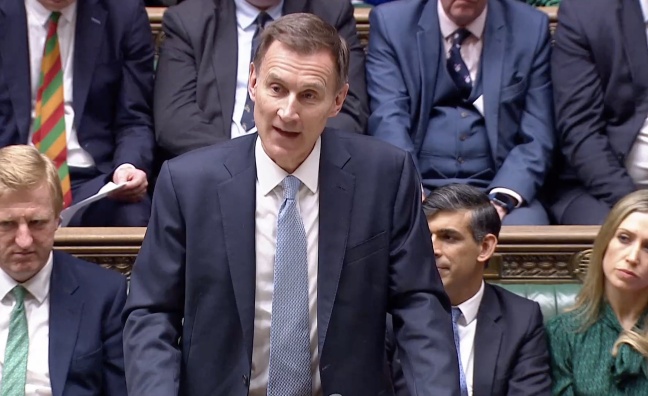UK Music interim chief executive Tom Kiehl has welcomed Chancellor Jeremy Hunt’s Budget move to make Orchestra Tax Relief (OTR) permanent at a rate of 45%.
The current temporary 50% rate of OTR was due to taper down from April 2025 and drop eventually to its original rate of 25%.
However, the Chancellor used his Budget statement on March 6 to announce that OTR would become permanent at 45%.
The move followed calls from UK Music, the collective voice of the music industry, and its members to do more to support the sector.
Tom Kiehl said: “I welcome that the Chancellor has listened to industry calls to put in place extensions to the orchestras tax relief on a permanent basis.
“The government should use this opportunity to clarify our further calls as to whether touring choirs and other singing groups are also eligible for this important relief.
“We welcome the indirect benefit to music of the introduction of other creative sector tax reliefs and seek further government consideration for the introduction of a tax credit to encourage new UK music production.”
Introduced in 2016, OTR is aimed at supporting live orchestral performances. The headline rate was raised to 50% in 2021 in the wake of Covid and was extended in 2023 for a further two years until April 2025.
The Musicians’ Union and the Association of British Orchestras were among the many groups that had called on the Chancellor to make the relief permanent.
The Chancellor also announced tax relief support for the theatre industry and film sector.
Jon Collins, CEO of LIVE, said: “LIVE welcomes the Chancellor's announcement that the tax reliefs for orchestras and theatres will be made permanent. However, today's Budget represents yet another missed opportunity to accelerate the growth of the live music sector and the wider economy while also providing urgently needed support for grassroots music through the reintroduction of a lower VAT rate. 20% VAT on tickets in the UK is vastly out of step with our competitors in Europe and North America and has become a material factor limiting the number of gigs, tours and festivals our world class industry can put on.
“Fewer shows mean reduced economic activity in towns and cities across the country – an estimated £1m is spent in local businesses for every 10,000 people who attend a gig – and heaps further pressure onto grassroots music venues that are closing down at an alarming rate. We need urgent action to ensure the whole sector can prosper in the long term."
AIF CEO John Rostron commented on the Spring Budget: "We're disappointed that our calls for support for the UK music festival sector have not been met. Festivals need a temporary reduction in VAT on ticket sales from 20% to 5% in order to recover from the impact of Covid and Brexit, which has created a credit crunch that is seeing successful festivals having to postpone or cancel this year months before their events are due to take place. Yet another festival fell yesterday – the 15th event to fall already in 2024.
"Theatre has made the case for tax relief, which is being extended indefinitely. We urge the Chancellor and the Treasury to now turn to festivals and offer a fraction of that support to ensure more events do not make 2024 their last."
Silvia Montello, CEO of AIM, said: "Music contributes over £6 billion to the UK economy a year. However, further support will be required from the government in order to maintain our position in the global market and continue to develop world-leading artists.
“This should include fiscal incentives for the independent businesses that find and invest in the global stars of tomorrow and tax breaks for music along the lines of initiatives supporting the film and TV industries. These measures would also help to counter the damage done to local music scenes over recent years through the reduction in arts and culture funding across the UK. There is still a vital need for support for artists and concert venues in order to weather the current crisis facing live music.
"Finally, we also urge the government to consider the need for stronger copyright standards to ensure creators are fairly remunerated when AI systems are trained on their work, as well as greater help for freelance workers, who make up around 70% of workers in the music business.”









